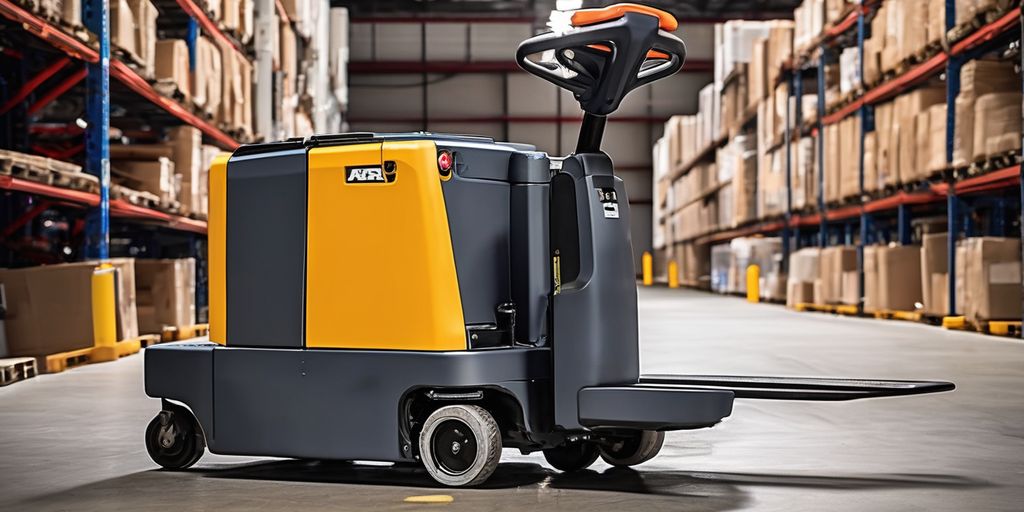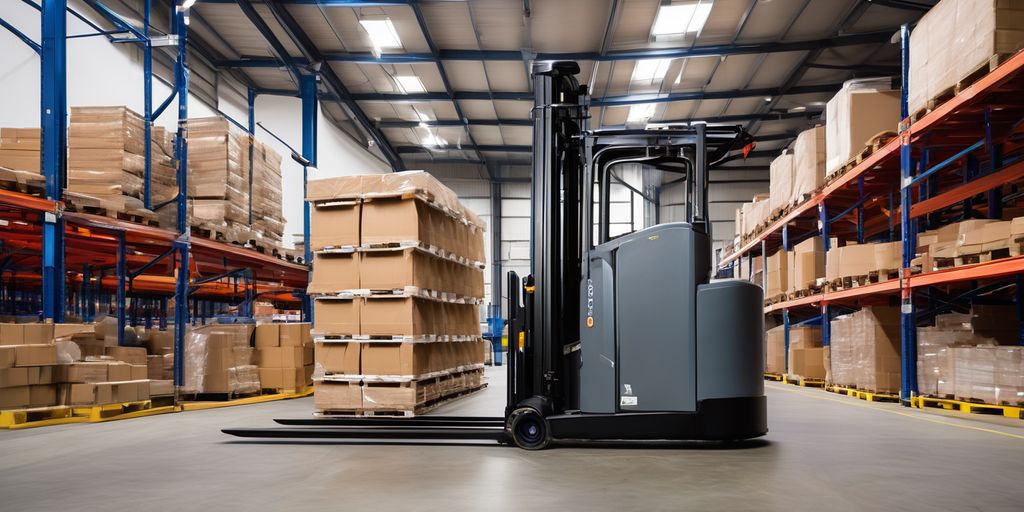Fork truck batteries are the heartbeat of material handling operations, providing the necessary power to lift heavy loads and move materials efficiently. Proper maintenance of these batteries is crucial for ensuring seamless operations, minimizing downtime, and extending the lifespan of the batteries. This ultimate guide will walk you through the different types of fork truck batteries, proper charging techniques, routine maintenance practices, safety measures, lifespan extension tips, troubleshooting common issues, and environmental considerations for disposal.
Key Takeaways
- Understanding the different types of fork truck batteries, including lead-acid, lithium-ion, and nickel-iron, is essential for selecting the right battery for your needs.
- Proper charging techniques, such as following charging schedules and avoiding overcharging, can significantly extend the lifespan of your fork truck batteries.
- Routine maintenance practices, including cleaning, inspection, and checking fluid levels, are vital for keeping your batteries in optimal condition.
- Safety measures, such as using personal protective equipment and designating safe charging areas, are crucial for preventing accidents and injuries.
- Environmental considerations, including recycling and adhering to legal regulations, are important for responsible disposal of fork truck batteries.
Understanding Fork Truck Battery Types
Fork truck batteries are the heartbeat of material-handling electric vehicles, providing the power to lift heavy loads and move materials efficiently. Are you considering battery options for your forklift? Understanding the different types of batteries available is crucial for making an informed decision.
Lead-Acid Batteries
Lead-acid batteries, also known as wet cell batteries, are the most commonly used type of battery for forklifts. They are popular due to their low cost and high energy density. These batteries are reliable and have been in use for many years, making them a trusted choice for many operations.
Lithium-Ion Batteries
Lithium-ion (Li-ion) batteries are a newer technology compared to lead-acid batteries. They offer several advantages, including faster charging times and longer lifespan. These batteries are also maintenance-free, which can save time and reduce operational costs in the long run.
Nickel-Iron Batteries
Nickel-iron batteries are less common but offer unique benefits such as high durability and long cycle life. They are resistant to overcharging and can operate in a wide range of temperatures, making them suitable for various environments.
Choosing the right type of battery for your application can significantly impact the efficiency and cost-effectiveness of your operations.
Proper Charging Techniques for Fork Truck Batteries

Charging your fork truck battery correctly is crucial for maintaining its longevity and performance. Consistency is vital when it comes to charging your forklift battery. Regular, planned charging sessions prevent deep discharges and promote a longer battery life. Establishing a charging routine based on the forklift’s usage patterns is essential.
Routine Maintenance Practices
Routine maintenance is essential for ensuring the longevity and performance of your fork truck batteries. Regular inspections and upkeep can prevent costly repairs and downtime. Below are some key practices to follow:
Cleaning and Inspection
Regular cleaning and inspection of your fork truck batteries are crucial. Dirt and debris can cause short circuits and other issues. Ensure that the battery terminals are clean and free from corrosion. Inspect the battery casing for any signs of damage or wear.
Checking Fluid Levels
Maintaining the correct fluid levels in your batteries is vital for their performance. Low fluid levels can lead to overheating and reduced battery life. Regularly check the electrolyte levels and top up with distilled water as needed.
Battery Watering
Proper battery watering is essential for maintaining the health of your fork truck batteries. Use only distilled water and avoid overfilling. Implement a regular watering schedule to ensure optimal performance.
Implementing a detailed maintenance plan that outlines tasks, frequencies, and responsibilities can streamline your maintenance activities and ensure compliance with industry standards.
Safety Measures for Handling Fork Truck Batteries
Personal Protective Equipment
When handling fork truck batteries, safety is paramount. Operators should always wear appropriate personal protective equipment (PPE) such as gloves, safety goggles, and acid-resistant aprons. This helps protect against potential hazards like chemical burns and electric shocks.
Safe Charging Areas
Charging fork truck batteries should only be done in designated areas that are well-ventilated and free from open flames or sparks. These areas should be equipped with proper ventilation systems to disperse any harmful gases that may be released during the charging process.
Emergency Procedures
In case of an emergency, such as a battery leak or fire, it is crucial to have well-defined emergency procedures in place. Employees should be trained on how to handle such situations, including the use of fire extinguishers and emergency shutdown protocols.
Establishing proper handling protocols, including using personal protective equipment and providing training for operators, ensures a safe working environment during maintenance tasks.
Extending the Lifespan of Your Fork Truck Battery
Temperature Management
Proper temperature management is crucial for extending the lifespan of your fork truck battery. Batteries should be stored in a cool, dry place to prevent overheating and degradation. Avoid exposing batteries to extreme temperatures, as this can significantly reduce their lifespan.
Regular Inspections
Conducting regular inspections helps identify potential issues before they become major problems. Check for signs of wear and tear, corrosion, and loose connections. Regular maintenance practices help extend the lifespan of forklift batteries.
Proper Storage
Storing your batteries correctly can make a big difference in their longevity. Ensure batteries are stored upright and in a well-ventilated area. Follow manufacturer guidelines for storage to maximize battery life.
Implementing these practices can significantly prolong the battery's useful life, reducing the need for frequent replacements and lowering operational costs.
Troubleshooting Common Fork Truck Battery Issues
Identifying Battery Sulfation
Battery sulfation is a common issue that can significantly reduce the efficiency of your fork truck battery. Sulfation occurs when lead sulfate crystals form on the battery plates, hindering the battery's ability to hold a charge. To identify sulfation, look for symptoms such as reduced battery capacity, longer charging times, and a higher self-discharge rate. Regular maintenance and proper charging techniques can help prevent this issue.
Addressing Voltage Drops
Voltage drops can indicate underlying problems with your fork truck battery. These drops can be caused by several factors, including poor connections, damaged cells, or sulfation. To address voltage drops, start by inspecting the battery terminals and connections for any signs of corrosion or damage. Ensure that all connections are tight and clean. If the issue persists, it may be necessary to test the individual cells and replace any that are faulty.
Recognizing Physical Damage
Physical damage to fork truck batteries can lead to serious performance issues and safety hazards. Common signs of physical damage include cracks in the battery casing, leaking electrolyte, and warped or bulging sides. If you notice any of these signs, it's crucial to take immediate action. Replace damaged batteries promptly to avoid further complications and ensure the safety of your operations.
Regular inspections and maintenance tasks help identify potential hazards such as leaks, corrosion, or damaged components. By addressing these issues promptly, logistics managers can ensure a safe working environment for their employees.
Environmental Considerations and Disposal
Recycling Fork Truck Batteries
Recycling forklift batteries helps mitigate their environmental impact by recovering valuable materials and preventing hazardous waste from entering landfills. Companies are obliged to take measures to minimize soil contamination, such as using flooring that prevents the absorption of acidic liquids and employing drip trays.
Environmental Impact
Battery electrolytes contaminate soil, posing a significant threat to the environment. Proper disposal and recycling practices are essential to prevent this contamination. Compliance with battery regulations requires meticulous record-keeping, regular inspections, and adherence to proper disposal protocols.
Sustainable forklift practices: eco-friendly solutions for material handling. Embracing sustainability in forklift operations with green solutions and training for efficient use.
Legal Regulations
Forklift batteries are subject to specific regulations and safety standards. Managing compliance manually can be time-consuming and prone to errors, increasing the risk of non-compliance. Regular training and knowledge transfer are crucial to ensure that all staff members are aware of and adhere to these regulations.
Conclusion
In conclusion, maintaining your forklift batteries is not just about prolonging their lifespan, but also about ensuring the efficiency and safety of your entire fleet. By following the comprehensive guidelines outlined in this ultimate guide, you can minimize downtime, reduce operational costs, and enhance the productivity of your warehouse operations. Remember, a well-maintained battery is the heartbeat of your forklift, driving seamless logistics and superior performance. We hope this guide has provided you with valuable insights and practical tips to optimize your forklift battery maintenance strategy. If you have any questions or experiences to share, feel free to leave a comment below. Happy lifting!
Frequently Asked Questions
What are the different types of fork truck batteries?
The main types of fork truck batteries are Lead-Acid Batteries, Lithium-Ion Batteries, and Nickel-Iron Batteries. Each type has its own advantages and disadvantages depending on the application.
How often should I charge my fork truck battery?
Charging frequency depends on the type of battery and its usage. Generally, it's recommended to charge the battery after each shift or when it drops to 20-30% of its capacity.
What is an equalizing charge and why is it important?
An equalizing charge is a prolonged charge that balances the voltage of each cell in the battery. It helps to prevent sulfation and extends the battery's lifespan. This should be done every 5-10 charging cycles for lead-acid batteries.
How do I properly maintain my fork truck battery?
Routine maintenance includes regular cleaning and inspection, checking fluid levels, and battery watering. Proper charging and avoiding overcharging are also crucial for battery health.
What safety measures should I take when handling fork truck batteries?
Always use personal protective equipment (PPE) such as gloves and safety goggles. Ensure that charging areas are well-ventilated and have emergency procedures in place for handling spills or leaks.
How can I extend the lifespan of my fork truck battery?
To extend your battery's lifespan, manage its temperature, perform regular inspections, and store it properly when not in use. Avoid deep discharges and overcharging to maintain optimal performance.




Leave a comment
This site is protected by hCaptcha and the hCaptcha Privacy Policy and Terms of Service apply.